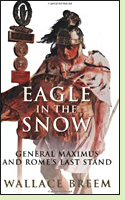Eagle in the Snow
by Wallace Breem
Reviewed by David Maclaine

Eagle in the Snow is a superb capstone to the story of Rome's rise and fall. Wallace Breem was a writer of astonishing power, and his novel brilliantly captures the mood of the final twilight years of Roman rule before the barbarians swept that world away. His protagonist and narrator is a general, stationed in the early stages of the book in northern Britain where he survives the betrayals that lead to invasion and deep personal loss. He then takes service under Stilicho, the energetic Goth who tries hard to hold the beleaguered Western Empire together, and he accepts the thankless job of holding the line against the restless hordes across the Rhine. The harried commander has too few Roman troops, supplemented with some allies on both sides of the river, but it will clearly take brilliant leadership and a lot of luck to keep the crucial Roman wall along the Rhine from being swept away. Brilliant leadership he has, along with the resolve to fight the good fight for as long as he can. But our narrator is badly outnumbered, and the onset of a winter cold enough to freeze the river brings on a desperate battle. Although we know how the fight must end we are nevertheless caught in the high drama and steady suspense of the long, hard-fought defense.
I read Eagle in the Snow right after finishing Harry Sidebottom's Fire in the East, another novel about a commander charged with a hard defense against overwhelming odds. Breem's great accomplishment is that he provides not only a detailed, utterly believable account of the complex military action, matching Sidebottom's craft and deep knowledge, but also adds a layer of literary excellence: a command of description and mood and pure beauty of language that raises this novel from the very good to something more. From the viewpoint of one devoted soldier, steadfast in his duty, we are made to feel the deep loss when an army dying in the snow signals the Empire's end. (1970, 320 pages)
More about Eagle in the Snow at Powell's Books or Amazon.comEagle in the Snow appears on the list of The 50 Best Historical Novels for a Survey of Ancient Roman History
Other novels about the fall of the Roman Empire:
The Fall of Rome by Michael Curtis Ford (2007), about the warfare during the fall of the Roman Empire. More info
Lest Darkness Fall by L. Sprague de Camp (1941), about a history professor who goes back in time and tries to prevent the fall of Rome. More info
Antonina; Or, The Fall of Rome by Wilkie Collins (1850), a romantic novel about a woman living through the sack of Rome by the Goths. More info
Nonfiction about the fall of Rome:
How Rome Fell: Death of a Superpower by Adrian Goldsworthy (2009). More info
The Fall of the Roman Empire by Peter Heather (2005). More info
The End of the Roman Empire: Decline or Transformation? edited by Donald Kagan (third edition, 1992). More info
Online:
Decline of the Roman Empire at Wikipedia
Back to Novels of Ancient History
Back to Directory of Book Reviews